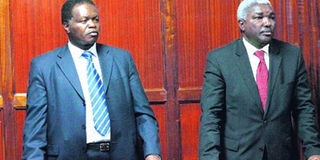Govt misled on value of Tokyo embassy, says official

Charge d'Affairs in the Kenyan embassy in Tokyo Allan Mburu and Former Foreign Affairs PS Thuita Mwangi in a Nairobi court in February 2013. Mr Mburu said the government was misled on the value of the property. |
What you need to know:
- The petitioner said that in her valuation report dated May 25 2009 Mrs Kimondui “wrongly” stated amongst other things that the economic lifespan of a building constructed in natural stone was 20 years while a wooden one was 10 years and that only the site on which the building stood was valuable.
A foreign affairs ministry official facing prosecution over the Sh1.5 billion Tokyo Japan Embassy case has claimed the government was misled on facts preceding the acquisition of the property.
Mr Allan Mburu the Charge d'Affairs at the Tokyo Embassy told the court that the state valuer misled authorities on the economic lifespan of the embassy premises and on a crucial question of whether there were other embassies in the Meguro Ward neighbourhood in which the Kenyan embassy was situated.
“I believe the two factors were crucial in determining the value attached to the premises and the misstatement of facts by Mrs Teresia Kimondiu which significantly affected the value she attached to the premises,” a further affidavit filed by Mr Allan Mburu before justice David Majanja read partly.
Mr Mburu had been sued alongside the former Foreign Affairs Ministry PS Thuita Mwangi and ambassador Anthony Muchiri.
The trio want the high court to find that their “prosecution was informed by malice and misrepresentation of facts.”
A judge Monday allowed Mr Mburu to file another affidavit challenging the competence of the valuer and citing the role played by former ambassador, Dennis Awori in the acquisition of the property.
“The acquisition of the embassy premises was in furtherance of the government decision to acquire its own premises, in line with a government policy adopted in the year 2006,” he said.
“As earlier deposed, treasury authorized the purchase of the plot in question for the sum of Sh1.5 billion and this in turn made it possible for ambassador Awori to inform the Japanese government that the Kenya government was no longer interested in purchasing the plot it had offered and whose offer price the Japanese government had said was fixed,” the official said.
Mr Mburu claims Mrs Kimondui contradicted a statement by Japanese government in Nairobi on May 27 2010 which stated that in “accordance with Japanese tax laws, the lifespan of stone buildings is 38 years for living purposes and 41 years for office usage.”
The petitioner said that in her valuation report dated May 25 2009 Mrs Kimondui “wrongly” stated amongst other things that the economic lifespan of a building constructed in natural stone was 20 years while a wooden one was 10 years and that only the site on which the building stood was valuable.
He also faulted the valuer for misleading the government that “no embassies were located in the neighbourhood” while the statement of fact from the Embassy of Japan, in Nairobi on May 2010 at the height of the probe stated to the contrary that there were 15 other embassies in the Meguro Ward.
“It is within my personal knowledge that a ministerial tender committee met four times and subsequently approved the direct procurement method for the purchase of the property in question," said Mr Mburu.
He added that a negotiations team was sent to Tokyo after which a purchase price of Sh1.5 billion was later reached contrary to the misinformation that the Japanese government offered Kenya a plot for free.
“It is also within my personal knowledge that prior to the purchase the then PS Thuita Mwangi had written to the PS Treasury Joseph Kinyua proposing that value for money audits be conducted …as a result an audit that approved the Tokyo embassy purchase was undertaken,” Mr Mburu said in his affidavit.




